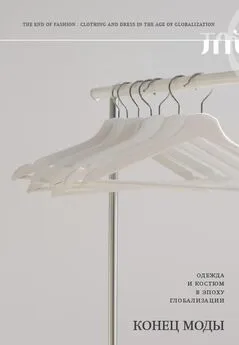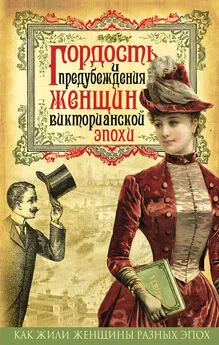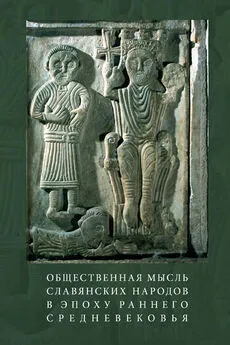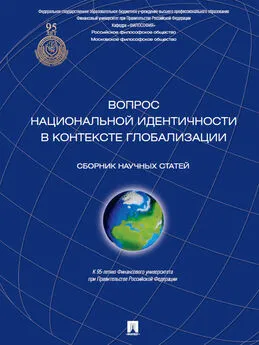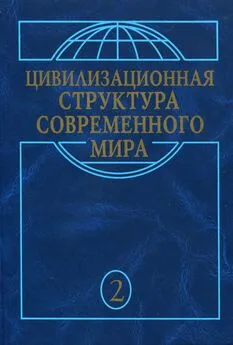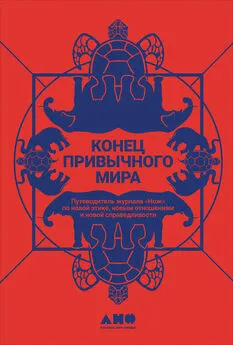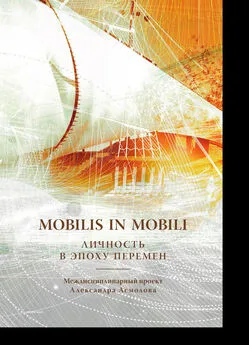Коллектив авторов - Конец моды. Одежда и костюм в эпоху глобализации
- Название:Конец моды. Одежда и костюм в эпоху глобализации
- Автор:
- Жанр:
- Издательство:Литагент НЛО
- Год:2020
- Город:Москва
- ISBN:9785444814048
- Рейтинг:
- Избранное:Добавить в избранное
-
Отзывы:
-
Ваша оценка:
Коллектив авторов - Конец моды. Одежда и костюм в эпоху глобализации краткое содержание
Конец моды. Одежда и костюм в эпоху глобализации - читать онлайн бесплатно ознакомительный отрывок
Интервал:
Закладка:
Gamber W. The Female Economy: The Millinery and Dressmaking Trades, 1860–1930. Urbana: University of Illinois Press, 1997.
Garage Centre for Contemporary Art. Dysfashional. Last modified 2017. garagemca.org/en/event/dysfashional (accessed 01.09.2017).
Garcia P. Dress the Part: Only Lovers Left Alive // Vogue. 2014. April 10. www.vogue.com/article/dress-the-part-only-loversleft-alive-fashion (accessed 08.05.2017).
Geczy A., Millner J. Fashionable Art. London; New York: Bloomsbury, 2015.
Geczy A., Karaminas V. (eds) Fashion and Art. Oxford; New York: Berg, 2012.
Geczy A., Karaminas V. Fashion’s Double: Representations of Fashion in Painting, Photography and Film. London; New York: Bloomsbury, 2016.
Geczy A., Karaminas V. Lady Gaga, American Horror Story, Fashion, Monstrosity and the Grotesque // Fashion Theory: The Journal of Dress, Body & Culture. 2017. Vol. 21.6. Pp. 621–627.
Giannone A. La costruzione del senso filmico nell’abbigliamento e nel costume // Moda e cinema / Ed. P. Calefato. Genova: Costa & Nolan, 1999.
Gilbert D. From Paris to Shanghai: The Changing Geographies of Fashion’s World Cities // Fashion’s World Cities / Ed. Ch. Breward, D. Gilbert. Oxford: Berg, 2006. Pp. 3–32.
Gilchrist T. Only Lovers Left Alive’s Tilda Switnon Talks Playing a Vampire, Working with Tom Hiddleston // Daily Dead. 2011. November 4. dailydead.com/lovers-left-alives-tilda-swinton-talks-playing-vampire-workingtom-hiddleston/ (accessed 08.05.2017).
Gill A. Deconstruction Fashion: The Making of Unfinished, Decomposing and Reassembled Clothes // Fashion Theory: The Journal of Dress, Body & Culture. 1998. Vol. 2.1. Pp. 25–49.
Gizmodo Media Group. Photoshop of Horrors // Jezebel. 2017. jezebel.com/tag/photoshop-of-horrors (accessed 07.06.2017).
Gledhill Ch. (ed.) Stardom: Industry of Desire. London: Routledge, 1991.
Glickman L. B. Buying Power. A History of Consumer Activism in America. Chicago: Chicago University Press, 2009.
Granata F. Deconstruction Fashion: Carnival and the Grotesque // Journal of Design History. 2012. 26, no. 2. Pp. 182–198.
Green N. J. Ready-to-Wear and Ready-to-Work: A Century of Industry and Immigrants in Paris and in New York. Durham, NC: Duke University Press, 1997.
Greenberg C. The Collected Essays and Criticism edited by John O’Brian. Chicago; London: Chicago University Press, 1993. V. 4.
Gregory A. Has the Fashion Industry Reached a Transgender Turning Point? // Vogue. 2015. April 21. www.vogue.com/article/andreja-pejic-transgender-model (accessed 08.06.2017).
Grigoriadis V. Death of One’s Own // New York Magazine. 2003. December 8. nymag.com/nymetro/news/people/n_9589/ (accessed 12.05.2017).
Gronbach E. Global Local: Movements and Counter-movements in the «Fashion Generation» // Generation Mode / Ed. Sussanne A., Gronbach E. Düsseldorf: Hatje Cantz, 2006. Pp. 21–33.
Grunenberg Ch. Wonderland: Spectacles of Display from the Bon Marché to Prada // Shopping / Ed. Ch. Grunenberg, M. Hollein. Ostfuldern-Ruit: Hatje Cantz Publishers, 2002. Pp. 17–37.
Hacker Factor. Fotoforensics. Last modified 2017. June 7. fotoforensics.com (accessed 07.06.2017).
Hansen M. Cinema and Experience: Siegfried Kracauer, Walter Benjamin, and Theodor W. Adorno. Berkeley, CA: University of California Press, 2011.
Hardy J. Sponsored Content Is Compromising Media Integrity // Open Democracy. 2017. www.opendemocracy.net/jonathan-hardy/sponsored-content-is-blurring-line-between-advertising-and-editorial (accessed 14.04.2017).
Hegel G. W. F. Phänomenologie des Geistes. Frankfurt am Main: Suhrkamp, 1986.
Hegel G. W. F. Vorlesungen über die Ästhetik, Werke 14. Frankfurt am Main: Suhrkamp, 1986.
Heilbrun C. G. Toward a Recognition of Androgyny. New York: Norton, 1993 [1964].
Hepp A. Differantiation: Mediatization and Cultural Change // Mediatization of Communication / Ed. K. Lundby. Berlin: De Gruyter, 2009. Pp. 139–157.
Hepp A. The Communicative Figurations of Mediatized Worlds // Communicative Figurations. 2013. 1. www.kommunikativefigurationen.de/fileadmin/redak_kofi/Arbeitspapiere/CoFi_EWP_No-1_Hepp.pdf (accessed 20.06.2015).
Hepp A. Cultures of Mediatization. Cambridge: Polity, 2013 [2011].
Van Herpen I. Iris Van Herpen: Transforming Fashion. Groninger: Groninger Museum and High Museum of Art, 2015.
Hilton B., Choi C. J., Chen S. The Ethics of Counterfeiting in the Fashion Industry: Quality, Credence and Profit Issues // Journal of Business Ethics. 2004. 55, no. 4. Pp. 345–354.
Hirschmann A. O. Exit, Voice, and Loyalty. Responses to Decline in Firms, Organizations, and States. Cambridge, MA: Harvard University Press, 1972.
Hjarvard S. The Mediatization of Society: A Theory of the Media as Agents of Social and Cultural Change // Nordicom Review. 2008. 29, no. 2. Pp. 105–134.
Hjarvard S. The Mediatization of Culture and Society. Oxon: Routledge, 2013.
Hoelzl I., Remi M. Soft Image: Towards a New Theory of Digital Image. Bristol; Chicago: Intellect, 2015.
Holson L. M., Abrams R. For the Trumps, Made in USA May be a Tricky Label to Stitch // New York Times. 2016. December 28. www.nytimes.com/2016/12/28/business/donald-trump-ivanka-clothes-global-tradeoverseas-manufacturing.html?_r=0 (accessed 15.05.2017).
Horyn C. Why Raf Simons Is Leaving Christian Dior // The Cut. 2015. October 22. nymag.com/thecut/2015/10/raf-simons-leavingchristian-dior.html (accessed 30.01.2017).
Hoskins T. E. Stitched Up: The Anti-Capitalist Book of Fashion. London: Pluto Press, 2014.
Hunt E. Essena O’Neill Quits Instagram // The Guardian. 2015. November 3.
Hynes E. Tilda Swinton Lives by Night // The Rollingstone. 2014. April 1. www.rollingstone.com/movies/news/tilda-swinton-lives-bynight-20140401 (accessed 13.05.2017).
Instagram. Post by @Leonardhoespams. 2016. September 15. www.instagram.com/p/BKZAe_zgQYl/ (accessed 08.06.2017).
Irvine S. The Mysterious Cristóbal Balenciaga // The Telegraph UK. 2013. September 3. fashion.telegraph.co.uk/news-features/TMG10275681/The-mysterious-Cristobal-Balenciaga.html (accessed 10.05.2017).
Irwin D. A. Peddling Protectionism: Smoot-Hawley and the Great Depression. Princeton, NJ: Princeton University Press, 2011.
Isaac-Goize T. Star Curator Olivier Saillard Is Headed to J. M. Weston // Vogue. 2017. June 30. www.vogue.com/article/olivier-saillardweston (accessed 17.08.2017).
Jansson A. The Mediatization of Consumption: Towards an Analytical Framework of Image Culture // Journal of Consumer Culture. 2002. 2, no. 5. Pp. 5–31.
Jansson A. Using Bourdieu in Critical Mediatization Research // MedieKultur. 2015. 58. Pp. 13–29.
Jenkins H. Convergence Culture: Where Old and New Media Collide. New York: New York University Press Press, 2006.
Jennings M. W., Doherty B., Levin Th.Y. The Work of Art in the Age of Its Technological Reproducibility, and Other Writings on Media. Massachusettes: Harvard University Press, 2008 [1935].
Johnstone N. Dare to Bare // The Observer. 2005. March 13.
Joy A., Sherry Jr. J. F., Venkatesh A., Wang J., Chan R. Fast Fashion, Sustainability, and the Ethical Appeal of Luxury Brands // Fashion Theory: The Journal of Dress, Body & Culture. 2015. April. Vol. 6.3. Pp. 273–296.
Kammer A. The Mediatization of Journalism // MedieKultur. 2013. 54. Pp. 141–148.
Kansara V. A. Is the New Style.com Working? // BOF. 2016. www.businessoffashion.com/articles/digital-scorecard/is-condenast-style-com-working (accessed 04.01.2017).
Karaminas V. Image: Fashionscapes – Notes Toward an Understanding of Media Technologies and Their Impact on Contemporary Fashion Imagery // Fashion and Art / Ed. A. Geczy, V. Karaminas. London; New York: Berg, 2012. Pp. 177–188.
Kardashian West K. Selfish. New York: Rizzoli, 2015.
Kaun A., Fast K. Mediatization of Culture and Everyday Life. Mediestudier vid Södertörns högskola:1. Karlstad University Studies, 2014.
Kawamura Y. The Revolution in Paris Fashion. Oxford; New York: Berg, 2004.
Kidwell C. B., Christman M. Suiting Everyone. The Democratization of Clothing in America. Washington, DC: Smithsonian, 1974.
Klein N. No Logo. Taking Aim at the Brand Bullies. New York: Knopf, 1999.
Klein N. This Changes Everything: Capitalism vs. the Climate. London: Penguin Books, 2015.
Klinger U., Svenson J. The Emergence of Network Media Logic in Political Communication: A Theoretical Approach // New Media & Society. 2015. 17, no. 8. Pp. 1241–1257.
Kooser A. Viral Optical Illusion Asks If These Legs Are Oiled or Painted // CNET Magazine. 2016. October 26. www.cnet.com/news/viral-optical-illusion-legs-oily-paint-the-dress/ (accessed 08.06.2017).
Kortti J. Media History and the Mediatization of Everyday Life // Media History. 2017. 1, no. 23. Pp. 115–129.
Krauss R. E. Sculpture in the Expanded Field // The Originality of the Avant-Garde and Other Modernist Myths. Cambridge, MA: The MIT Press, 1985. Pp. 276–290.
Krotz F. Explaining the Mediatisation Approach // Javnost – The Public (Journal of the European Institute for Communication and Culture). 2017. 2, no. 24. Pp. 103–118. doi:10.1080/ 13183222.2017.1298556 (accessed 11.05.2017).
Kurnilius R., Reunanen E. Changing Power of Journalism: The Two Phases of Mediatization // Communication Theory. 2016. 26. Pp. 369–388.
Kuspit D. The End of Art. Cambridge: Cambridge University Press, 2004.
La Ferla R. Imitate That Zipper // New York Times. 2009. September 2. www.nytimes.com/2009/09/03/fashion/03OWENS.html?pagewanted=all&_r=0 (accessed 10.05.2017).
La Ferla R. In Fashion, Gender Lines Are Blurring // New York Times. 2015. August 19. www.nytimes.com/2015/08/20/fashion/infashion-gender-lines-are-blurring.html?_r=0 (accessed 13.05.2017).
Landerer N. Rethinking the Logics: A Conceptual Framework for the Mediatization of Politics // Communication Theory. 2013. 23. Pp. 239–258.
Landow G. P. Hypertext 2.0. Baltimore: Johns Hopkins University Press, 1997.
Larner W., Molloy M. Globalization, Cultural Economy, and Not-so-Global Cities: The New Zealand Designer Fashion Industry // Environment and Planning D 25. 2007. P. 381–400.
Larsson J., Mouwitz P., Peterson J. Knit on Demand – Mass Customisation of Knitted Fashion Products // The Nordic Textile Journal. Special Edition. Fashion & Clothing. 2009. Pp. 108–121.
Lasica J. D. Photographs That Lie: The Ethical Dilemma of Digital Retouching // State of the Art. Issues in Contemporary Mass Communication / Ed. D. Shimkin, H. Stolerman, H. O’Connor. New York: St. Martin’s Press, 1992. Pp. 189–194.
Laudon K. C., Traver C. G. E-commerce 2016: Business.Technology. Society. Boston, MA: Pearson, 2017.
Lazzeretti L., Capone F., Casadei P. The Role of Fashion for Tourism: An Analysis of Florence as a Manufacturing City and Beyond // Tourism in the City: Towards an Integrative Agenda on Urban Tourism / Ed. N. Bellini, C. Pasquinelli. Switzerland: Springer International, 2017. Pp. 207–220 [eBook Edition].
Le Zotte J. From Goodwill to Grunge. A History of Secondhand Styles and Alternative Economies. Chapel Hill: The University of North Carolina Press, 2017.
Leach W. R. Land of Desire. Merchants, Power, and the Rise of a New American Culture. New York: Vintage, 1994.
Lees-Maffei G., Fallan K. (eds) Made in Italy. London: Bloomsbury, 2014.
Lewis J. (ed.) The End of Cinema as We Know It. New York: New York University Press, 2001.
Lewis T., Loker S. Trying on the Future: Exploring Apparel Retail Employees’ Perspectives on Advanced In-Store Technologies // Fashion Practice. 2017. 9, no. 1. Pp. 95–119.
Читать дальшеИнтервал:
Закладка:
